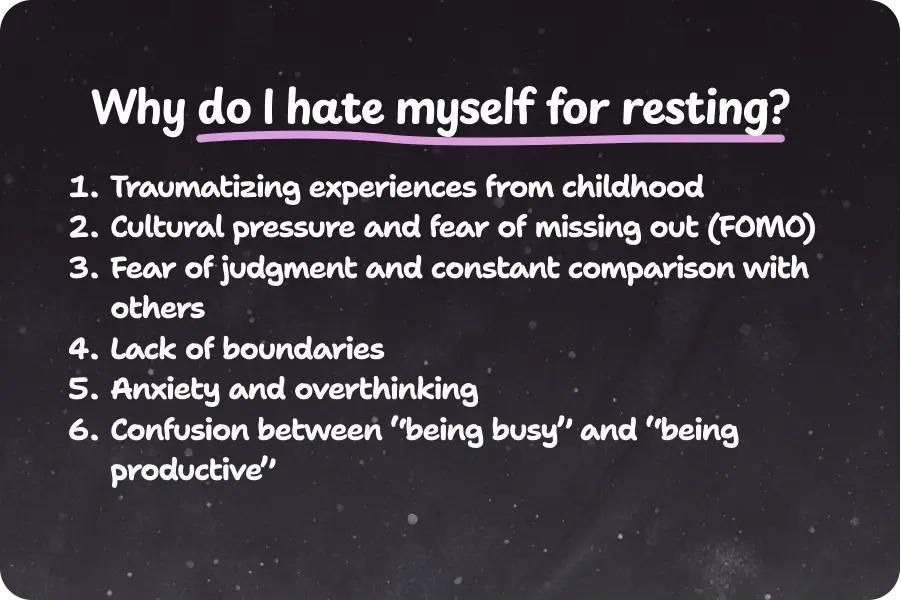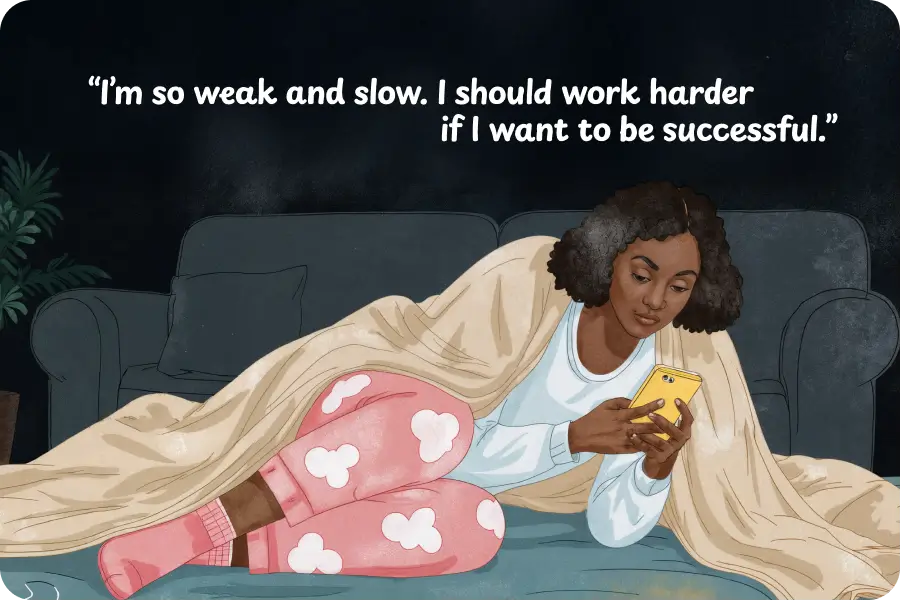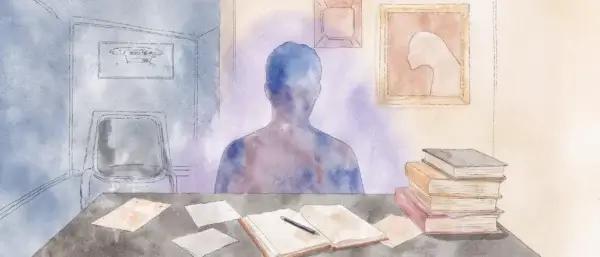You feel guilty anytime you need to stop doing something “productive.” Time on the way home, spending an evening with a loved one, and sometimes even doing chores, feels like a waste of time.
These are manifestations of productivity guilt. In the article, we’ll find out why you can’t simply rest without getting worried or beating yourself up over it. You’ll learn to recognize productivity guilt in its early stages and find out how to reduce it and rewire your mindset to enjoy everything you do and invest in proper rest.
What is productivity guilt?
Productivity guilt is the feeling of shame, anxiety, or self-blame for not being productive enough. It typically comes out during moments of rest but can also arise when a person doesn’t manage to accomplish everything on their to-do list.
Such self-criticism might stem from a person’s belief that achievements identify their worth, and if you’re not working hard, it makes you lazy and “not good enough.” Over time, productivity guilt can create a vicious cycle: you push yourself to the limit, feel exhausted, blame yourself for resting, and try to have even more tasks done at the expense of your overall wellness.
Why do I hate myself for resting?
People may feel anxious for rest due to inner wounds or the pressure of the environment they live in or were raised in. Sometimes these causes may also blend together and reinforce each other. Let’s explore the most common reasons behind this feeling.
1. Traumatizing experiences from childhood that lead to low self-compassion
If your parents or close relatives constantly pushed you to do more and achieve more, now it can lead to you experiencing productivity guilt. “Why are you watching TV? Have you already done all the homework? What about that test next week? Are you sure you’re ready for that?” If this phrase sounds familiar, maybe you developed an achievement-based mindset in the past.
This is especially typical for dysfunctional families where one or both parents are narcissists, live with severe anxiety, or are in constant conflict. It can also happen in families where a parent navigates substance abuse. A kid growing up in such an environment may become a golden child or a scapegoat:
- A golden child is someone who was praised as the loved one in a family but at the same time needed to meet the unrealistic expectations of a dysfunctional family system. These kids learn that being perfect and productive is the only way to stay worthy of affection and avoid criticism or help the family system avoid conflict by giving them something positive to focus on.
- A scapegoat is a kid who was blamed for everything and made to feel “never good enough,” even if they did more than a golden child. Such children may experience self-doubt and engage in overachievement to deserve “love.” At the same time, they might feel guilty or unworthy for not being busy all the time.
2. Cultural pressure and fear of missing out (FOMO)
The American Psychological Association (APA) highlights that achievement culture negatively influences youths’ mental health. [1] Today, social media, mass media, influencers, and even educational systems promote the idea that being productive 7 days a week is the only way to achieve success. This mindset can make some people neglect their work-life balance and feel guilty about taking short breaks or even weekends with family.
For some cultures, it’s also typical to promote an idea of buying an apartment, having children, and building a family at a young age. When people don’t follow this traditional trajectory, they may feel “behind,” which makes productivity guilt even stronger.
3. Fear of judgment and constant comparison with others
Some may find it difficult to live in the present moment, as they worry that society will see them as lazy or unmotivated. Imagine enjoying a lovely weekend and accidentally seeing your friends posting Instagram stories about how busy and productive they are.
If you immediately get anxious and feel a rush to do something from the to-do list (especially aiming to post it on your stories as well), that’s a sign that external expectations shape your sense of self-worth.
How often do you compare yourself to others?
4. Lack of boundaries
Freelancers, entrepreneurs, and people with no clear working schedule can simply be confused about when their workday finishes and the weekend starts. If for you rest means having coffee on the way to the client’s office or taking a nap at 4 pm after a whole night of work, you may really feel guilty when you try to take genuine downtime.
Without clear boundaries, work steps into personal life, and one Sunday, you may find yourself taking a bubble bath while still working through your phone. And only setting specific times for hard work or rest can change the situation.
5. Anxiety and overthinking
You might experience excessive anxiety about specific tasks, tough deadlines, or the success of the overall project. In this case, even a few hours of rest feels like something that shouldn’t be allowed. And if you try to rest, overthinking can make you constantly worry about what might go wrong next, which only turns downtime into another source of stress.
6. Confusion between “being busy” and “being productive”
For some people, it can be difficult to separate productivity from their working hours. They might believe that if they work from the early morning till late at night, they’re super effective. However, it isn’t always the case.
Modern jobs require creativity, attention to detail, and innovative approaches. And if your brain is tired, you may spend the whole day doing the task that takes 2 hours. So, when you feel guilty for resting, remember that you need this time to improve your focus and work even better.

The psychology behind feeling guilty for resting
Productivity guilt is closely connected to toxic productivity — obsessive preoccupation with being productive at all costs and never feeling like what you’ve done is “enough.” [2] This mindset gets deeply ingrained in people’s minds in environments that reward constant achievement, while cultural expectations and social comparison make it even stronger.
We can observe this phenomenon in today’s society. Research shows that 46% of U.S. workers who receive paid time off from their employer take less time than they are offered. [3] People can skip vacations or short breaks, fearing that stepping away from work will make them appear less committed or place their jobs in jeopardy.
Resting can also be confused with procrastination. Procrastination means a voluntary delay in completing the task despite expecting negative outcomes. Rest, at the same time, can feel equally “wrong” under the pressure of constant productivity, and taking a break may trigger guilt similar to putting off work.
But while procrastination is a self-regulation failure [4], rest is an important and healthy way to offset burnout and clear your mind. The main difference is intention: procrastination puts off tasks even though you know it could cause problems, while rest gives you energy and helps you work better in the long run.
Signs you might experience rest guilt
Emotional instability and physical well-being challenges can be the first indicators that you experience a constant need to be productive. Below, we’ll explore the most common signs of rest guilt.
1. Relaxing feels like wasting time or a sign of weakness
Your schedule is full of tasks and meetings, and every free minute feels wrong. You can get overwhelmed when the way to work takes 15 more minutes, or you need to take a sick day due to a high temperature. Moments when you aren’t doing anything “important” feel like wasting time and missing opportunities.
2. You’re anxious and restless all the time
Even when you need to calm down, it’s almost impossible to sit still. You can engage in stimming, talk a lot (mostly about work), or fidget to release tension. Your brain can’t focus on the present moment but rather waits for the time you can work again, as if productivity is the only state where you feel grounded.
3. You feel constantly tired and might face physical health issues
Muscle tension, sleep problems, changes in appetite, and frequent pains may signal that your body is timed to accomplish and needs to simply relax. If you wake up tired and rush to cross tasks off your to-do list while having no energy, you’re pushing yourself to limits. This can stem from productivity guilt.
4. You believe that you haven’t “earned” your break
For you, a day off is a luxury, and vacation sounds like something only people who have “done enough” deserve. Nevertheless, you never think that you’ve done enough.
Most people who try to deserve a break do it out of productivity guilt. But instead of being productive, it can lead to emotional burnout over time.
5. You notice the first signs of emotional burnout
Maybe burnout from being constantly “productive” is already here, and your brain and body are experiencing its early manifestations. The most common ones might include.
- Irritability
- Loss of interest in anything
- Problems with memory and concentration
- Decreased productivity
- Getting overwhelmed by small daily tasks
- Difficulty making decisions
“What should a person who notices the first signs of burnout do to get out of this state as soon as possible?” Katherine Scott, M.Ed/Ed.S, LMFT, answers, “When you first become aware of your experiences of burnout, it can be helpful to take 10-15 minutes sitting with your thoughts and writing down all contributing factors. This can be a list of pressing priorities, your to-do list, or fears you are trying to outrun with productivity. Next, it can be helpful to identify communities or a therapist that you can lean on to aid in verbally processing these pressures that ignite burnout. Letting our worries hit air in a safe space can do us wonderful when seeking clarity on finding relief.”
Common thoughts people have when they try to rest from hard work
Thoughts of people who feel guilty for resting might be associated with self-blame and worry. They dwell on what could’ve been done and focus on future plans instead of being here and now. This is how these thoughts can sound.
- Guilt. “I shouldn’t have agreed to visit this family gathering. There are so many things on my to-do list.”
- Anxiety. “What if I don’t manage to finish this project on time? I would be a complete failure.”
- Urgency. “This break is too long. I need to get back to work.”
- Doubt. “I’m not good at writing. I need to practice for the whole night to pass the exam successfully.”
- Perfectionism. “I need to exercise every day to stay fit. Missing one workout makes me weaker.”
- Shame. “My friends will think that I’m a loser if I don’t buy a car this year. I need to take one more freelance project.”
- Imposter feelings. “What if they decide that I don’t deserve this position? I don’t perform well enough.”
- Self-criticism. “I’m so weak and slow. I should work harder if I want to be successful.”
Try Breeze’s mood tracker to notice these thoughts early on and reframe them to more compassionate beliefs. The app allows you to track your mood and add the context of what caused it. After some time of usage, you can check advanced mood analytics and notice that breaks make you worried. This will become the first step towards getting rid of productivity guilt.
How to reduce productivity guilt and create a healthier relationship with rest
To enjoy life without feeling guilty for doing nothing, you may need to change your approach to rest. Here are some tips on how to do it.
1. Remember that self-care is a productivity boost
Consider how many things you can do when you’re exhausted after a busy week and how productive you are right after a refreshing weekend. You may realize that instead of working 5 hours more on Saturday and Sunday, you might need to rest, sleep well, or spend time doing something you enjoy. So on Monday (and during the rest of the week) you’ll be more productive and won’t need to work over the next weekend.
The same applies to short breaks during working hours. Studies prove that recovery activities between work tasks help prevent the impairing effects of accumulated strain. [5] Accept that even 10 minutes of rest can restore concentration, reduce stress, and improve overall efficiency.
2. Accept that the number of things you’ve done doesn’t define your self-worth
Maybe you need to work on your self-esteem to understand that you’re valuable as you are, without the need to stay constantly busy or put enormous effort into anything you do. To shift focus to other aspects of your life, try a simple writing exercise:
- List your accomplishments from the past week that aren’t related to work (or something that you consider productive). It can be spending quality time with loved ones, cooking something you like, practicing a hobby, or taking care of your body.
- Write down qualities that make you valuable. Be honest with yourself. These aren’t only efficiency or achievements. They can be traits like kindness, patience, creativity, empathy, humor, resilience, or the ability to support others.
- Create a few affirmations that you will repeat when negative emotions arise. These can be phrases like “I am enough as I am” or “My worth is not measured by what I do.” You can put them on your lock screen, write them down in a notebook, or repeat them out loud to feel less anxious.
3. Learn to notice small wins, not just big milestones
You can use the Breeze app to journal what you’re grateful for. It can be:
- Sending an important email or message on time
- Helping a colleague with something
- Completing the task that you considered boring
- Organizing your inbox or digital files
- Successfully delegating a task
- Giving constructive feedback to a colleague
These activities may not seem so important, but they’re also parts of your day. And, most importantly, they add up to the bigger picture and finally contribute to your overall progress. So, even if you didn’t do something wholesome today, you shouldn’t experience productivity guilt, as small tasks also matter.
4. Stop comparing yourself to others
Some people need more rest, while others can work longer hours without breaks. Everyone’s body and mind are different, and there’s nothing wrong with that.
Also, everyone has a different course of life in general. Ray Kroc began growing McDonald’s at 52, Arianna Huffington launched The Huffington Post at 55, and Yuichiro Miura climbed Mount Everest at 80. So, if you haven’t reached all your goals until now, remember that you can do it at any age. And you definitely shouldn’t feel guilty for relaxing.

5. Improve your time management and set a specific time for doing nothing
You may need to schedule your rest in advance and accept that you need to shift focus. After some time, you’ll notice positive effects on your productivity and won’t feel guilty for it. Here’s how to make rest a regular part of your routine:
- Block out specific times in your calendar for rest. It can be an hour of calming routine in the morning, a lunch break you spend going to a favorite cafe, and 3-4 hours in the evening you spend with your family.
- Use timers or reminders. You can try the Pomodoro method: work for 25 minutes and then have a 5-minute break. After a few cycles, take a longer break to reset your mind.
- Separate work and rest spaces. Even if you’re a remote employee, stop working from your bed. This will let you shift your brain for resting when it’s time to relax.
6. Try different activities and find the ones that bring you joy
To reduce productivity guilt, you may need to discover things that make you happy and help you truly relax. Probably, you already have some hobbies to begin with, like reading, cooking, drawing, or walking, for example. Try dedicating time to them without expecting results. You can also experiment with new activities you’ve never done before to discover what feels the most recharging.
Expert Insight
“It can be helpful to break your to-do list into sections throughout a week. Also, starting with easy-to-attain tasks and building your way into more time-consuming tasks can aid in prepping your system to be more successful at accomplishing items during a day. Dedicate a few weeks of practice to breaking down daily task lists to develop insight into what an attainable number of tasks per day is before developing expectations for yourself. Above all, give yourself grace, as every day creates different caveats to productivity, and we are all human!”
Katherine Scott
Mental health professional
The science of rest: why your brain and body need it for your well-being
You need to rest regularly because it directly influences your cognitive function, memory, problem-solving skills, immune function, and overall wellness. If a human’s body and mind don’t get enough rest, it can lead to physical illnesses and emotional burnout. [6]
“The Rest Test,” conducted by scientists from Durham University, involved over 18,000 participants from 134 countries. It was found out that:
- The amount of rest people have directly influences their well-being.
- The optimal time for rest per day is about 5-6 hours.
- 68% of the questioned people feel that they don’t have enough rest.
- The perception of rest is as important as the actual amount of rest people have. As such, if you feel guilty for relaxing, it can undermine the restorative effects of your break.
Final thoughts: how to rest without regret
If you used to fill your time with work and other productive tasks, it may be difficult to stop, calm down, and reflect on your life in general. However, high-quality rest is necessary to remain effective and accomplish your goals.
To enjoy rest without guilt, you may need to work on your self-worth and stop comparing yourself to others. If you feel that you can’t overcome productivity guilt on your own, it can be helpful to try the Breeze app.
Here, you can track your emotions related to rest and later discuss them with a mental health professional. You can also take self-discovery tests and use personalized insights to improve your sense of self-worth and feel better about giving yourself time to recharge.
Sources
- American Psychological Association. “Perfectionism and the high-stakes culture of success: The hidden toll on kids and parents.” 2024
- Harvard Health Publishing. “Beyond the grind: Toxic productivity and how it sabotages your well-being.” 2024
- Pew Research Center. “More than 4 in 10 U.S. workers don’t take all their paid time off.” 2023
- Záhorcová, Lucia & Enright, Robert. (2020). “The effects of self-forgiveness and shame-proneness on procrastination: exploring the mediating role of affect.” Current Psychology.
- Albulescu P, Macsinga I, Rusu A, Sulea C, Bodnaru A, Tulbure BT. “Give me a break!’ A systematic review and meta-analysis on the efficacy of micro-breaks for increasing well-being and performance.” PLoS One. 2022
- Channawar, Sonali. (2023). “A Study on The Cause and Effect of Burnout.” History Research Journal.
Disclaimer
This article is for general informative and self-discovery purposes only. It should not replace expert guidance from professionals.
Any action you take in response to the information in this article, whether directly or indirectly, is solely your responsibility and is done at your own risk. Breeze content team and its mental health experts disclaim any liability, loss, or risk, personal, professional, or otherwise, which may result from the use and/or application of any content.
Always consult your doctor or other certified health practitioner with any medical questions or concerns
Breeze articles exclusively cite trusted sources, such as academic research institutions and medical associations, including research and studies from PubMed, ResearchGate, or similar databases. Examine our subject-matter editors and editorial process to see how we verify facts and maintain the accuracy, reliability, and trustworthiness of our material.
Was this article helpful?








